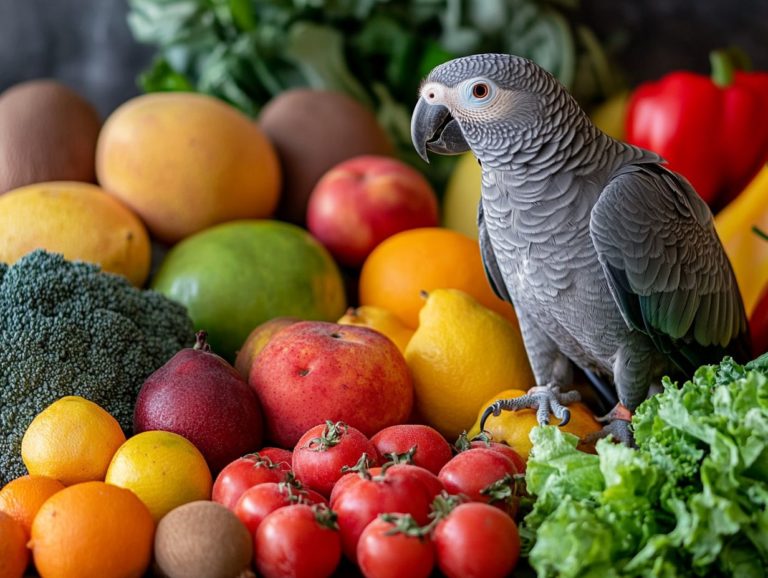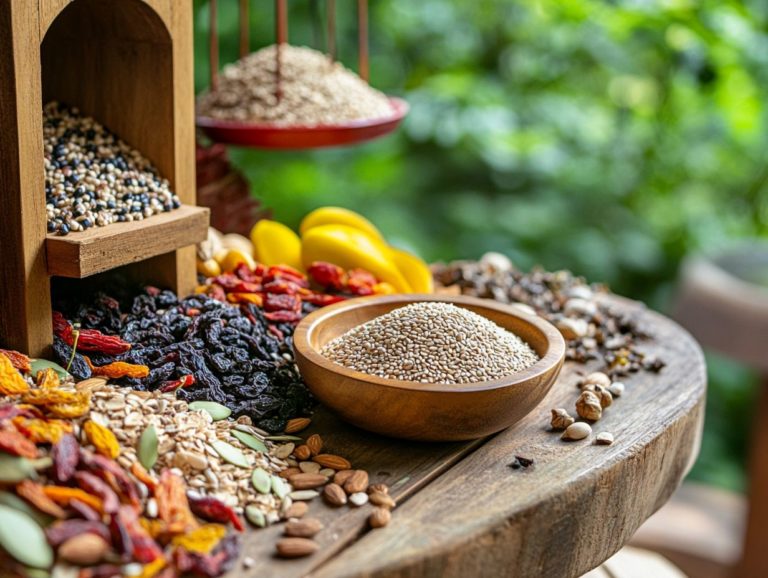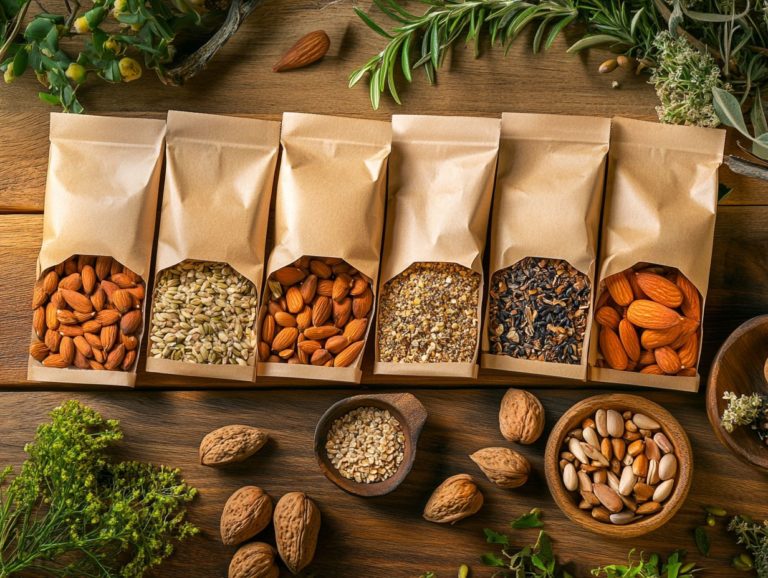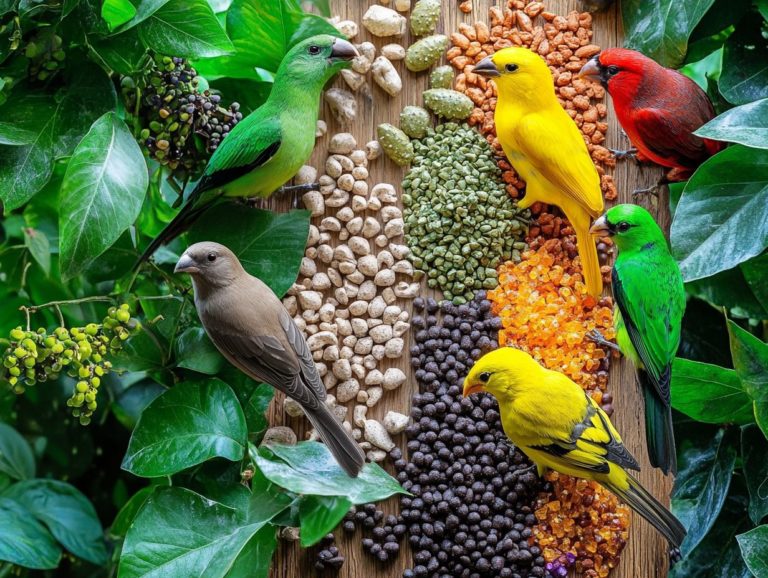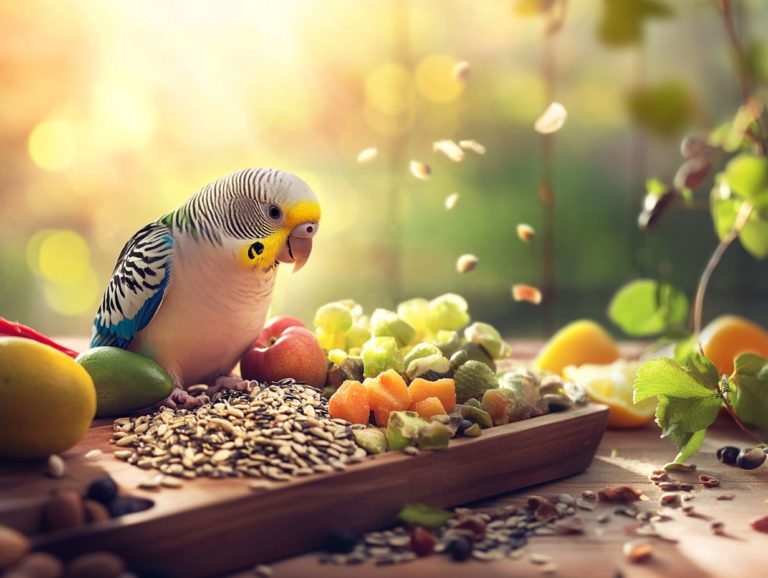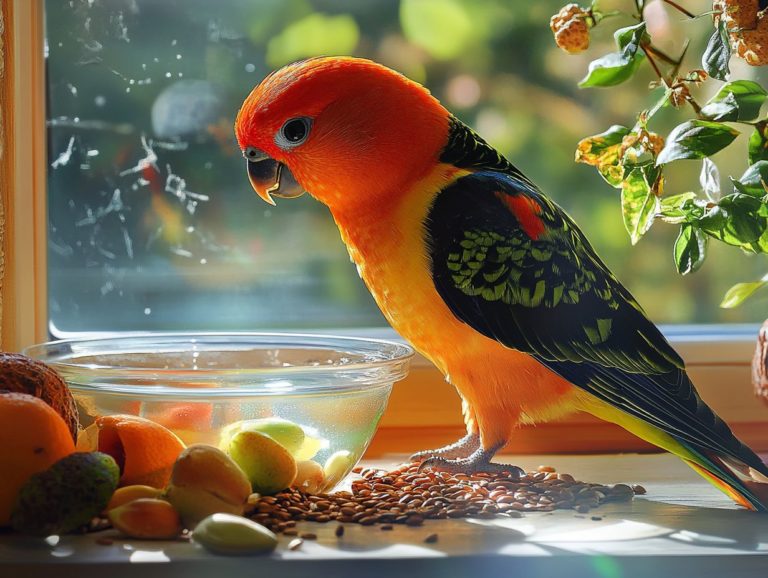5 Quick Tips for Feeding Your Bird
Feeding your feathered friend properly, especially with the right bird feeders, is vital for their health and happiness.
With a plethora of options at your fingertips, it can feel overwhelming to pinpoint the ideal diet for your bird. Get ready to discover five essential tips that will transform how you care for your birds! From selecting high-quality foods like black oil sunflower seeds to ensuring they always have fresh water and regularly cleaning their feeders, we cover everything you need to know.
You will also discover key nutrients, foods to avoid, including peanuts in separate portions, recommended feeding frequencies, signs of malnutrition, and effective ways to introduce new foods. Dive in to elevate your status as the ultimate bird parent and learn how to keep cats indoors and reduce window collisions for your avian friends!
Contents
- Key Takeaways:
- 1. Choose a High-Quality Diet
- 2. Provide Fresh Water Daily
- 3. Offer a Variety of Foods
- 4. Limit Treats
- 5. Clean and Sanitize Food and Water Dishes Regularly
- What Are the Essential Nutrients for Birds?
- Frequently Asked Questions
- What are 5 quick tips for feeding my bird?
- Why is offering a variety of foods important for my bird’s diet?
- How often should I offer fresh fruits and vegetables to my bird?
- What is a good source of calcium for my bird?
- Can my bird’s diet consist solely of seeds?
- Are balanced pellet diets necessary for my bird’s diet?
Key Takeaways:
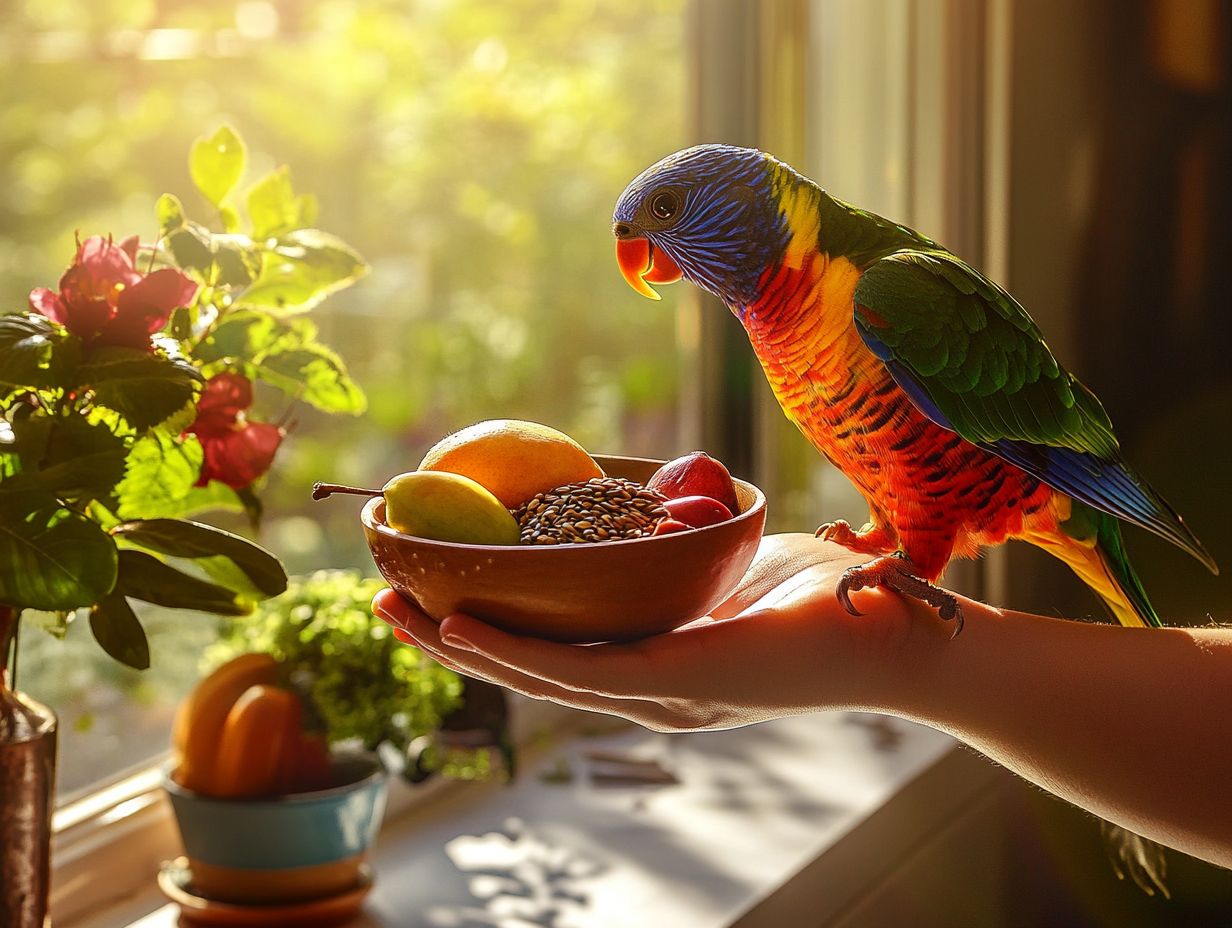
- Choose a high-quality diet for your bird to ensure they receive all essential nutrients, including a variety of seeds.
- Provide fresh water daily to keep your bird hydrated and healthy.
- Offer a variety of foods, including fruits, vegetables, and seeds, to keep your bird’s diet balanced and interesting.
1. Choose a High-Quality Diet
Choosing a high-quality diet is essential for attracting a diverse range of birds to your backyard. The right bird feeders filled with nutritious seeds, like black oil sunflower seeds and nyjer seeds, can draw in delightful species such as woodpeckers, wrens, chickadees, and nuthatches, elevating your bird-watching experience to new heights.
By investing in well-designed feeders, you ensure that these feathered visitors receive the nourishment they need to thrive. Black oil sunflower seeds and peanuts are particularly beneficial; their high fat content provides the vital energy active birds require. Nyjer seeds, a favored choice among finches, deliver essential protein to keep them healthy and happy.
To support your avian endeavors, organizations like the National Wildlife Federation stress the importance of proper feeding practices, such as using special feeders and educating the public on responsible bird feeding. This commitment fosters a healthier habitat for bird populations. Your dedication to conservation not only enriches your bird-watching experience but also plays a crucial role in sustaining bird species for generations to come.
2. Provide Fresh Water Daily
Providing fresh water daily is essential for your birds’ hydration and overall health, perfectly complementing the delightful spread from your feeders brimming with sunflower and nyjer seeds.
Especially during hot weather, having clean water sources can be a true lifeline for various bird species, such as hummingbirds, sparrows, and finches. These feathered friends depend on fresh water not just for drinking but also for bathing, which keeps their plumage in top-notch condition, especially when you offer nectar for hummingbirds.
To ensure the water remains pristine and safe, regular maintenance is key. This means changing the water frequently and using containers designed to prevent algae growth. Positioning water sources in shaded areas can also help keep the temperature cooler, inviting birds to stop by.
Ultimately, supplying fresh water can attract a wide array of birds, enriching the vitality of your garden and contributing to local biodiversity.
3. Offer a Variety of Foods
Offering a variety of foods is crucial for catering to the diverse dietary preferences of different bird species. Set up separate feeders for sunflower seeds, peanuts, and mixtures that include sunflower to attract both ground-feeding birds and those that relish fruits and berries.
Introducing nyjer seeds in specially designed thistle feeders can entice vibrant finches and fruit-eating birds to your space. Meanwhile, hanging suet cakes from tree branches or suet feeders will draw in woodpeckers, wrens, and other insect-eating birds during cooler weather.
Each type of food not only provides nourishment but also plays a vital role in attracting specific species, enriching local birdlife. This dietary diversity fosters a healthier ecosystem by supplying essential nutrition tailored to each bird s needs, encouraging them to thrive right in your backyard.
Now, it’s time to put these tips into action! Consider incorporating 5 superfoods for a healthier bird into your feeding routine and share your experiences to help create a welcoming environment for your feathered friends.
4. Limit Treats
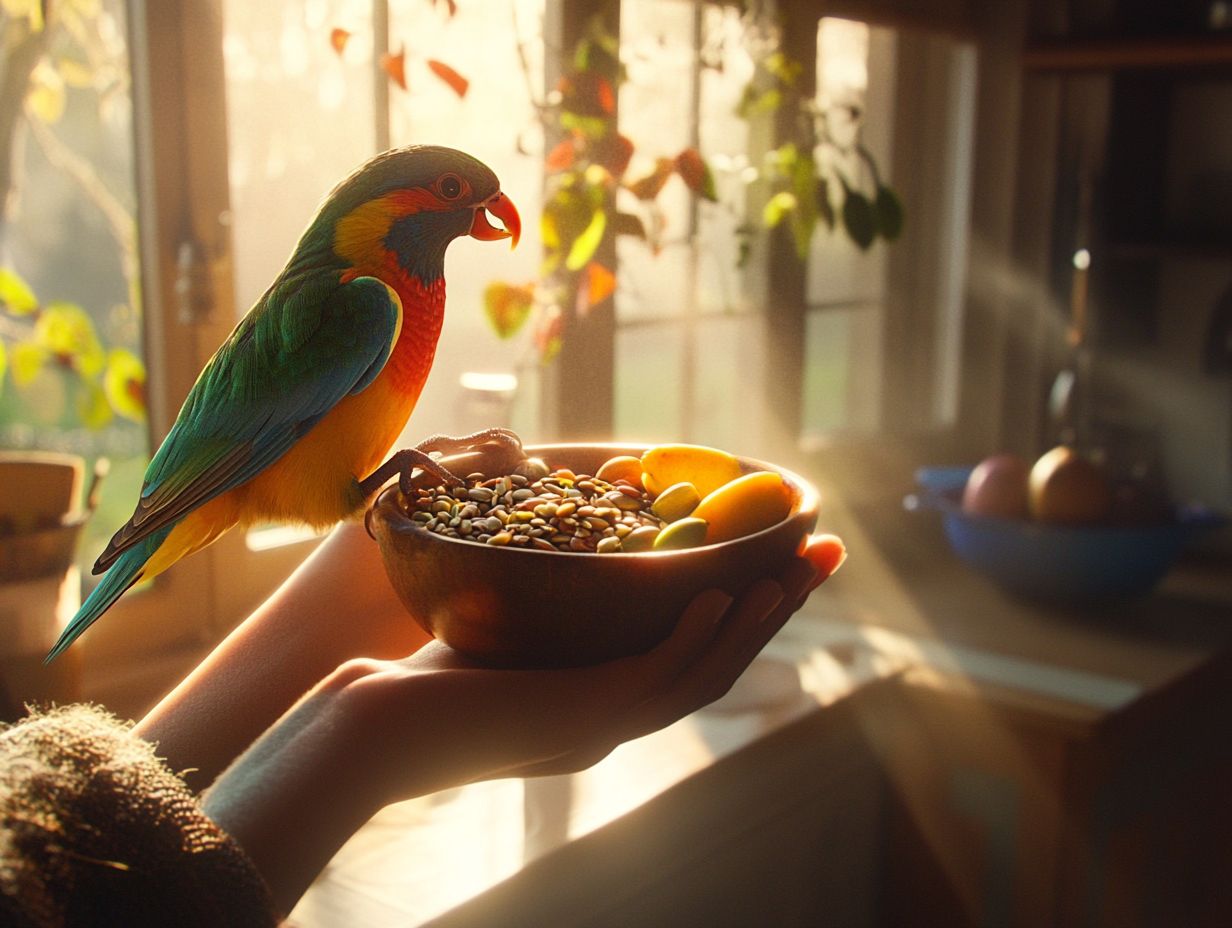
While treats like peanuts and peanut butter may captivate your feathered friends, including corn meal, keep treats limited for your birds’ health. A balanced diet emphasizes healthier choices over indulgent ones.
Too many high-fat treats can make birds unhealthy and heavy. Your birds thrive on a diverse array of seeds, such as black oil sunflower and nyjer seeds, fresh fruits, and vegetables, all of which provide essential vitamins and minerals. By offering treats in moderation, you satisfy their cravings and promote their overall well-being.
For healthier alternatives, consider providing small pieces of apple or leafy greens as a delightful snack. This strategy encourages a balanced intake of nutritious foods and treats, allowing your birds to relish something special without jeopardizing their health. Additionally, if you’ve recently adopted a bird, you might find helpful advice in our 5 tips for transitioning your bird post-adoption.
5. Clean and Sanitize Food and Water Dishes Regularly
Clean your bird’s dishes and feeders often to keep them safe. This prevents the spread of diseases among birds and creates a safe haven for your avian visitors.
Not only does this practice protect their health, but it also increases your chances of attracting a diverse array of species, including bluebirds and hummingbirds, to your yard. To clean these items effectively, use a mixture of warm water and mild soap steering clear of harsh chemicals that could harm the birds.
Scrubbing the surfaces with a brush will help remove stubborn residue, and rinsing thoroughly will ensure all soap traces are gone. For an added touch of sanitation, consider using a diluted vinegar solution as a natural disinfectant for your feeders; it kills germs without posing any risks to the birds.
Stick to this routine to create a welcoming place for more birds!
What Are the Essential Nutrients for Birds?
Birds need a mix of proteins, fats, and carbohydrates from different seeds, including black oil sunflower, to ensure they receive the energy and nutrition necessary for their health and vitality.
To support their overall well-being, including proper storage of seeds to secure against pests, provide a variety of options. For instance, consider offering black oil sunflower seeds, which are rich in fats and provide essential fatty acids to promote healthy feathers and skin.
Mealworms, along with raisins and currants, make for an excellent source of protein, vital for muscle development and energy replenishment. Don t forget to add fruits, such as berries, and leafy greens to introduce necessary carbohydrates and vitamins, helping birds maintain robust immune systems.
A balanced diet that incorporates these diverse food sources will not only enhance their physical condition but also significantly contribute to their longevity and overall happiness.
What Are Some Common Foods That Are Harmful for Birds?
Certain common foods can be harmful to birds, including chocolate, avocado, and caffeine. These foods are dangerous for birds and should be strictly avoided in your bird feeding practices.
These toxic compounds pose significant risks; for instance, theobromine found in chocolate can affect the heart and nervous system, while persin present in avocado can lead to respiratory distress and fluid buildup, similar to the effects of caffeine. Caffeine, on the other hand, may cause an increased heart rate and could have potentially fatal consequences.
To ensure the well-being of various bird species, it’s essential to provide safer alternatives, like using separate feeders for peanuts. Additionally, when feeding your parrot, opt for fruits like apples, bananas, and berries—these are excellent choices that deliver vital nutrients without the associated risks.
Add leafy greens or quality bird seeds to keep their diet balanced. For more comprehensive care, consider following the 5 steps to successfully train your bird. This will help create a healthy feeding routine that supports their health and vitality.
How Often Should You Feed Your Bird?
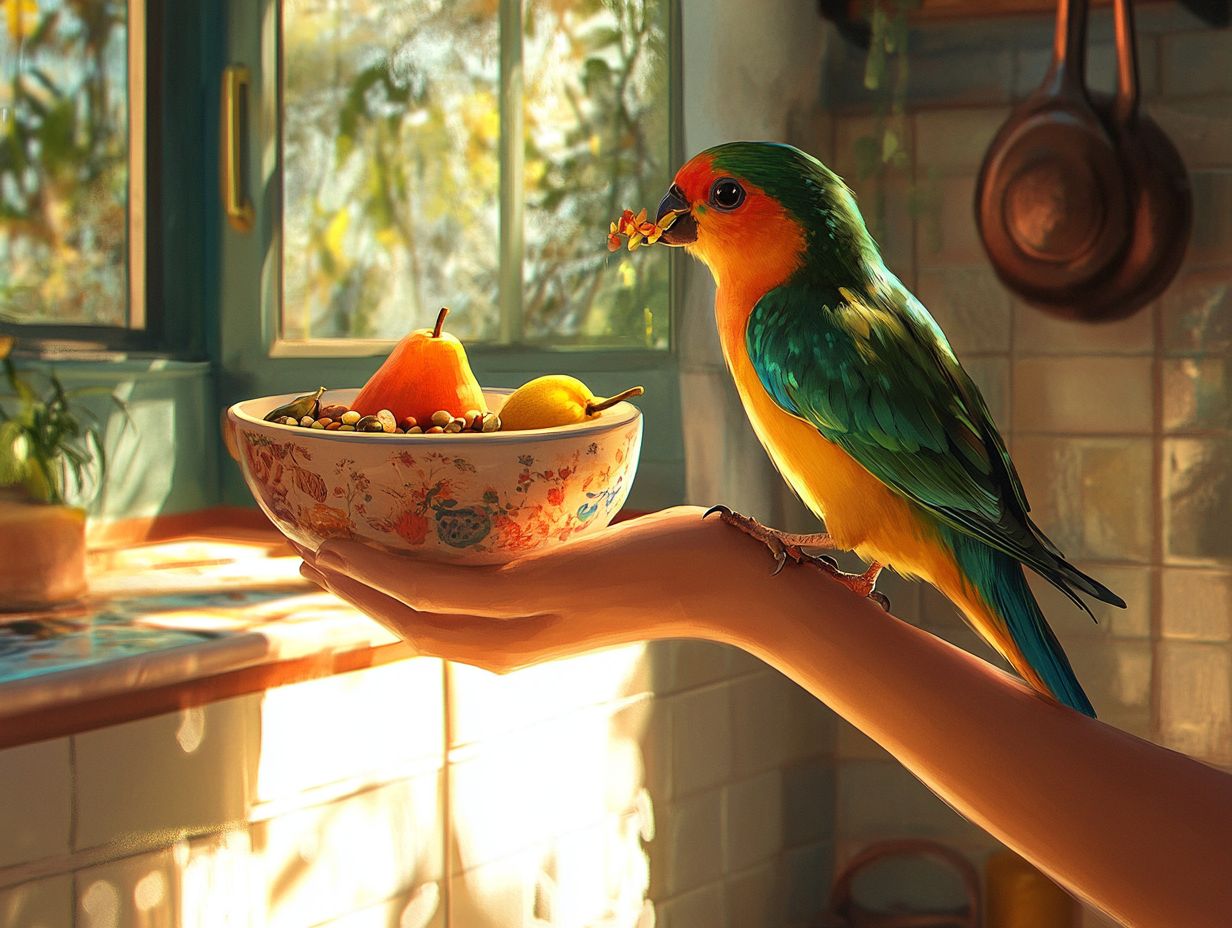
Establishing a consistent feeding schedule is crucial. Birds thrive on daily nourishment to ensure they receive the important nutrients. To further support their health, learn how to avoid overfeeding your bird. This also helps maintain their habitual visits to your feeders, especially with seasonal variations.
By sticking to a routine, you can create a dependable source of food that encourages your feathered friends to return frequently. Don t forget, seasonal changes can affect bird feeding! Many birds adjust their feeding behaviors with changing weather conditions.
For example, during the colder months, birds often require more energy. This leads to a spike in food consumption as they seek out bird feeders. In contrast, summer often brings fewer visitors as natural food sources become abundant.
Each bird species has its own preferences and dietary requirements. Therefore, diversifying the type of feed, including mixtures containing sunflower, you offer will help attract a broader range of birds, enhancing the biodiversity of your backyard.
What Are Some Signs of Malnutrition in Birds?
Signs of malnutrition in birds can reveal themselves through various symptoms, including feather loss, lethargy, and shifts in feeding behavior. These all indicate the necessity for a more nutritious diet that includes a variety of seeds and fresh fruits.
If your bird starts exhibiting overly aggressive behavior or loses interest in social interactions, these changes may hint at a nutrient deficiency that requires your immediate attention. Dietary diversity is crucial, not just for maintaining health but also for nurturing a vibrant and active lifestyle.
To ensure your feathered companion receives the essential nutrients, consider introducing a variety of foods into their diet, such as tips for training older birds.
- Fresh fruits
- Leafy greens
- High-quality pellets
It’s wise to monitor portion sizes and avoid an overreliance on seeds, which can lead to imbalances. Regular consultations with an avian veterinarian—a vet who specializes in birds—will also offer valuable insights on optimizing feeding practices for your bird’s health and well-being. Additionally, consider following tips for selecting the right bird toys to enhance their environment and mental stimulation.
How Can You Encourage Your Bird to Try New Foods?
Encouraging your bird to explore new foods can be a delightful journey. Introduce a variety of flavors and textures gradually, transforming the experience into something exciting and appealing for them.
By blending their beloved seeds with a few novel options, you create a delightful surprise that sparks their curiosity. Presenting food in different ways like scattering it throughout the cage or using foraging toys (toys that encourage birds to search for their food) can stimulate their natural instincts and make mealtime an adventure.
Patience is essential during this exploratory phase, as your bird may take some time to adjust to unfamiliar tastes and smells. By closely observing their reactions, you can pinpoint what they enjoy most, allowing you to customize their diet for a healthier lifestyle.
Frequently Asked Questions
What are 5 quick tips for feeding my bird?
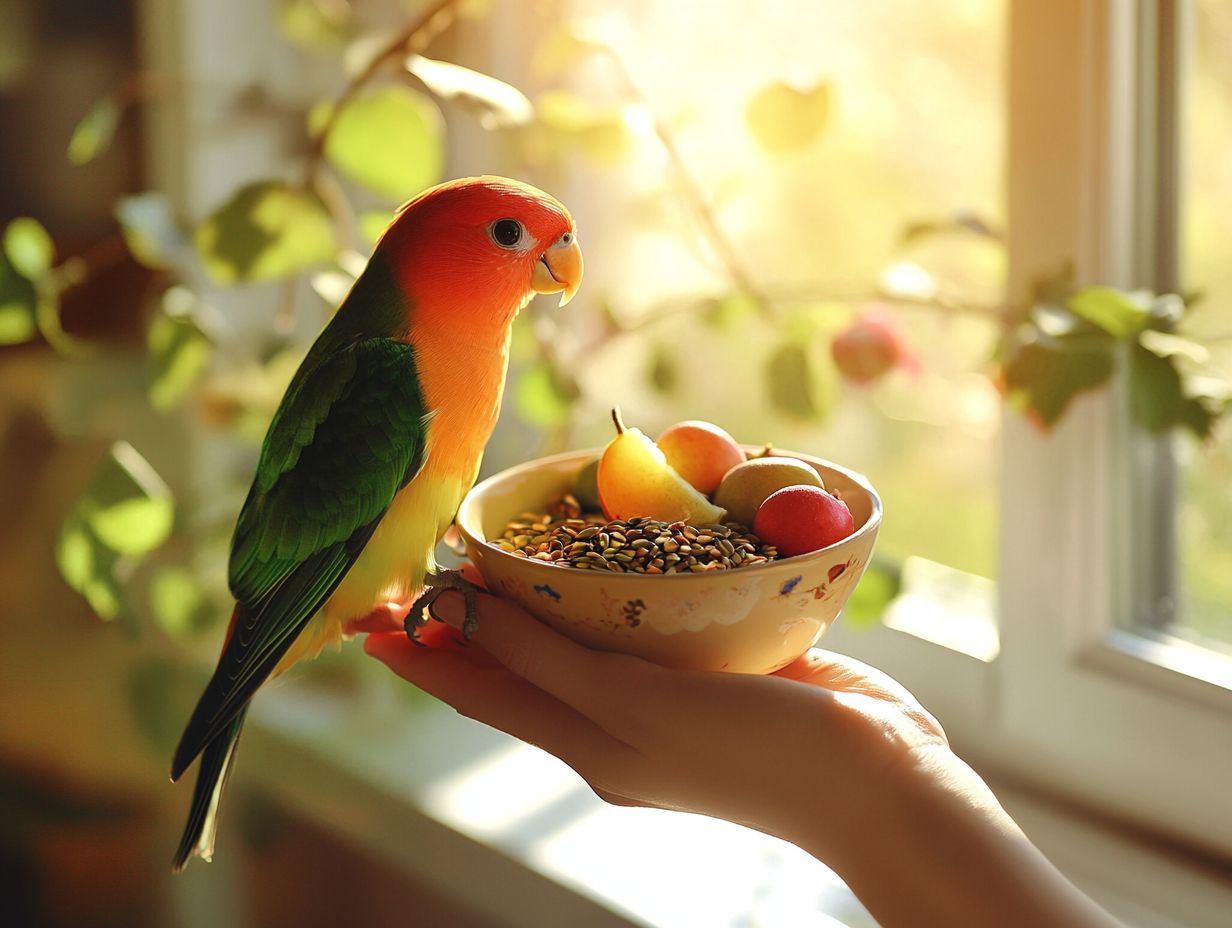
- 1. Offer a variety of foods.
- 2. Include fresh fruits and vegetables.
- 3. Provide a calcium source.
- 4. Limit seed intake.
- 5. Offer a balanced pellet diet.
Why is offering a variety of foods important for my bird’s diet?
Different foods offer different nutrients. Providing a variety ensures your bird gets all the necessary vitamins and minerals for optimal health.
How often should I offer fresh fruits and vegetables to my bird?
Fresh fruits and vegetables should be offered at least once a day to provide necessary vitamins and fiber for your bird’s diet.
What is a good source of calcium for my bird?
Cuttlebone, mineral blocks, and crushed eggshells are all excellent sources of calcium for birds. These can be offered in addition to a balanced diet.
Can my bird’s diet consist solely of seeds?
No, seeds are high in fat and lack important nutrients. A diet solely consisting of seeds can lead to health problems in birds.
Are balanced pellet diets necessary for my bird’s diet?
Yes, balanced pellet diets are formulated to provide all the necessary nutrients for your bird’s health. It is important to offer a combination of pellets and fresh foods for a well-rounded diet.

